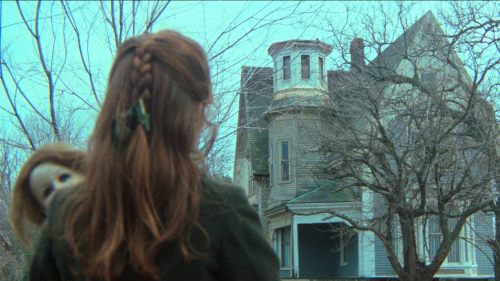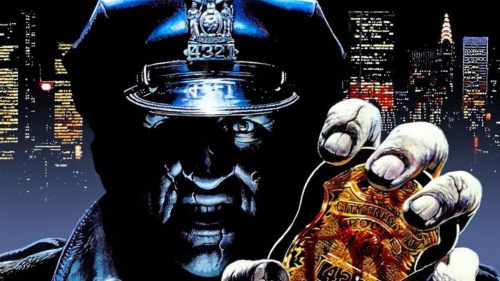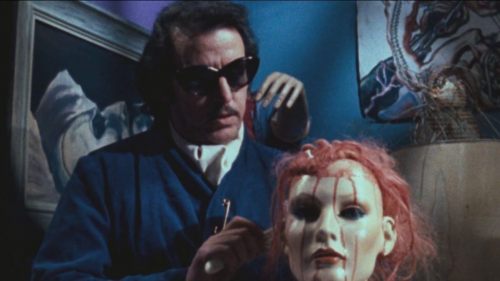The Badass Interview: William Lustig, Director Of MANIAC And VIGILANTE
You have an incredible cast in Vigilante. Can you talk about getting Robert Forster for the lead?
We were in pre-production and had hired another actor but it came to a point where we realized we had made a mistake, and we were desperate to find another actor. A friend of mine in California, Frank Pesce, who is also in Vigilante, had run into Robert Forster at a local club on Sunset Boulevard. Next thing you know he put me on the phone with Bob and we made a deal with his agent and he was on a plane and shooting in New York in a couple of weeks.
One of the things that always struck me about Vigilante is that it’s a really dark movie. Even for that time, when films about crime overrunning society were in vogue, Vigilante seems to be among the darkest and most nihilistic. Was that coming from a place where you were personally? Where did that tone come from?
It’s interesting because what I felt I was making was a potboiler, first and foremost. I guess what you’re probably responding to are a lot of the events that lead to Robert Forster going after the bad guys.
Yeah. The level of crime is so extreme.
If you’re making an urban retribution film, you kind of want to be more extreme. That’s what I tried to do with Vigilante, to make it the kind of film that would be a catharsis. You want to create events that will really rile audiences up so they get excited when the bad guys get their comeuppance. You want them to be doing extreme dastardly acts in order to get the audience’s blood boiling.
You made this in ‘82 or ‘83 for an exploitation circuit that’s very different from the distribution world today. How much were you trying to hit the key elements of the genre that began with Death Wish, which audiences expected, versus how much you were trying to stake your own territory?
Death Wish of course is the granddaddy of this kind of picture. After Death Wish there were the European, mostly Italian-made, films inspired by Death Wish. What I tried to do was make an American [version of those films]. What I saw it as, stylistically, was an urban spaghetti western. That’s how I viewed it musically, and with all of the set ups of the characters. Even the bad guys kind of look like they’re Indians a little bit. The music is very much inspired by Ennio Morricone. That’s where I was really going with the film to distinguish it from Death Wish.
You worked on Death Wish, right?
I was an apprentice editor on Death Wish. All I did was what’s called syncing the dailies, which is where you marry the picture and the sound for the editor to begin editing the film.
Before you got into directing quote unquote legit pictures you directed porn. How did you make the transition from porn to straight movies? Was it easier back then to make that leap?
Actually it was inevitable because when you were doing adult movies you were shooting them like regular movies. It wasn’t like today where those movies were made on DV cams and are made in two days. Two days? They’re made in an hour! But it was a lot different then; you were playing the films in theaters, you had stories, there was some modicum of acting and they weren’t just gonzo films.
There were many people during that time who made the jump between adult and exploitation films. It was very common.
You learned the tools of the trade there.
Absolutely. Adult films were my film school. I was able to learn the equipment, you learn proficiency. You learn how to shoot quick, how to be proficient with your time, and you get the insight into the equipment you need to make low budget movies. First and foremost as a director you need to know how to tell a story, but second you need to have the knowledge of the tools to be able to pull it off. What the adult business did was it gave me the knowledge of the tools.
And you don’t have the ability to go over budget or shoot extra days in porn.
You’re really disciplined. It’s because it was shot like real movies, there was a crew of up to 10-15 people - that’s not huge but that’s a real crew. That’s why you don’t see people coming out of adult movies these days and going into exploitation or anything, because they’re just making these quickies and gonzo films.
After that your first film was Maniac. Joe Spinell came to you with the idea for that, right?
I met Joe when I was a production assistant on a movie called The Seven Ups. Joe and I really bonded because we had a mutual love of horror films. We began hanging out, going to 42nd Street together seeing the latest horror films that opened that week. I have memories of Joe calling me at 3 in the morning saying ‘Let’s go see the 3:30 show of Hollywood Hillside Strangler.’ We would go to 42nd Street and we would be amongst Hillside Stranglers watching the movie. That was a great learning experience.
I started doing the adult movies, but with an eye towards doing horror films, and a horror film starring Joe Spinell. We began developing some scripts and trying to raise the money to do a horror film. Finally we got so frustrated because nobody would give us the money; I had saved up some money doing adult films, Joe decided to throw in his paycheck from Cruising and my boyhood friend Andy Garroni and with 48 thousand dollars we went out and shot Maniac.
I was told that the other writer on the picture, CA Rosenberg, is a woman.
Yes.
That’s interesting and seems like something a lot of people don’t know. This is one of the most extreme horror movies ever, and it was written by a woman! What did she bring to it?
She wrote the first draft of the movie, which was written more like a conventional cops chasing a serial killer. There were a lot of police in it, there was a detective. Joe wanted Jason Miller, his friend, to play the part. When Jason Miller dropped out of the project we decided that instead of replacing him to eliminate the police and to focus on the killer. We made it this lean, straightforward serial killer movie from the point of view of the serial killer and not to deviate from it and never show the world outside of his world. It made it a more intense movie. Plus we amped up the violence in the film.
Actually, it was a result of a Screen Actor’s Guild provision. We couldn’t afford to go SAG, and SAG has an exclusion for X-rated movies. They didn’t call them pornography, they call it X-rated. If I had submitted Maniac to the MPAA, it would have been X-rated. The idea was that we were making effectively an X-rated movie, so Joe Spinnell who was a prominent member of Screen Actor’s Guild, didn’t get fined by his union for being in the movie. And neither did any of the other actors who appeared in the film who were Screen Actor’s Guild members.
That’s a nice work around.
And it worked for the film creatively, because we could go with extreme violence.
And that got the film some notoriety.
Exactly. Things happen and you take advantage of it.
Did the notoriety of Maniac help Vigilante get made?
Not just the notoriety but the financial success. Maniac did well financially, and it made an impact in the foreign markets, so when we went to do Vigilante there was interest from distributors all over the world.
Your background is as an exploitation filmmaker, but your legacy may be that of someone who preserves great and off-beat movies with Blue Underground. How did that happen for you?
What happened is that in the 90s the world of making independent genre movies changed. It became corporatized. It became something less appealing and the films were being made almost like they were studio films, but they weren’t studio films. There was a lot of oversight, a lot of meddling in the projects. When I was making films in the 80s it was complete freedom. Even if I was making a film for a company they basically gave you the money and you showed them the film a few months later.
What happened? Why that change?
I think what happened is that the independent companies started to emulate the studios in installing middle management. They didn’t trust the filmmakers as they did in the 80s. And these companies all imploded because of it. They weren’t making interesting movies, and they increased their overheads. Also, the owners of the companies became less involved in the films. They delegated it to people who just weren’t film people, who didn’t have a good sense of film.
What I’m trying to say is that it became a situation where I became disinterested. At the same time I started doing film restorations for laser disc, and I was enjoying it. I was meeting people and preserving films that were being neglected and it was just a lot of fun. Then along came DVD and there I was at the infancy of DVD and it was something that immediately was successful, and I was making a good living at it and I never looked back. It wasn’t a conscious decision - it wasn’t like one day I had an epiphany. It was just something that happened.
Then you went to start your own company, Blue Underground. Now you’re focusing on truly underserved films, especially Italian movies.
I’ve always had an affection for those films. That’s why I jump at the opportunity to put out Argento and Fulci films, because those are films I love.
Is it a competitive environment for you to be getting these Argentos for Blu-ray?
Not at all, because I got them when these films were languishing. Their VHS rights had expired and no one was interested in these movies. In the mid-90s I was snatching up the rights to them and I’ve been maintaining the terms with these movies. It would be very costly for another company to come in and start from scratch and put them out. Because I have a good relationship with the licensors I distribute them perpetually.
We’re living in a remake happy world. I’ve heard about the possibility of a Maniac remake.
There’s one in the works.
What about Maniac Cop?
One of the things I’m in California to do is discuss with Larry Cohen what we want to do with it. I’m going to discuss with him how we’re going to go ahead with that.
But that’s something you definitely want to do.
Yeah, but one of the problems is… what would make it interesting is if we could somehow get back the rights to the first three films so that if we do another one whoever we do it with we can bring all the projects into that one place. It’s always more interesting as a franchise than it is a one off.
Is there a chance of you directing again?
Definitely. I’m looking at projects to do. Not Maniac Cop, but other things. And as Blue Underground is really up on its feet at this point I do have the time to be able to do other projects to direct.
You had talked in the past about Blue Underground producing stuff.
I don’t think that’s really possible in today’s economy. I’m just not set up to do it. It’s just not something I think is wise to get into right now.
What about digital streaming - stuff like Netflix? Does that feel to you like the next frontier?
I think digital holds a lot of potential, but it’s still in a phase where people are trying to figure out what to do. I would say that it’s a market which is in a flux, but eventually it’s going to get sorted out. But it’s still not fully worked out yet.



